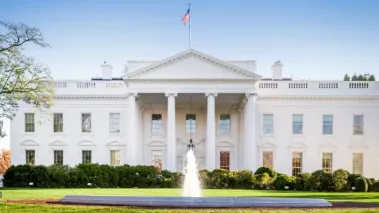Table of Contents
White House wrongly calls for investigation into UNLV professor’s comments

Video of UNLV history professor Tessa Winkelmann’s in-class comments last Thursday, in which she said that President Donald Trump’s rhetoric was at least partially to blame for the Oct. 1 massacre of concertgoers on the Las Vegas Strip, has drawn the ire of the White House.
“Right when he got elected, I told my classes, three semesters ago, that some of us won’t be affected by this presidency, but others are going to die,” Winkelmann says on the video captured by a student and obtained by the Las Vegas Review-Journal. “Other people will die because of this.”
The student, who filmed the comments and agreed to speak to the Journal on condition of anonymity, called the professor’s comments “polarizing” and “appalling.”
Troublingly, White House press secretary Sarah Huckabee Sanders told the Journal in a subsequent interview that she agreed with the student, calling for an investigation into the professor’s comments.
“It is sad she is teaching students such divisive, inaccurate and irresponsible rhetoric,” Sanders told the Journal. “She should be ashamed of herself, and the university should look into it. What a terrible example to set for students.”
Although the White House has the right to respond to criticisms, the professor’s comments clearly constituted protected speech and should never be subjected to investigation.
Investigations into protected classroom speech are incompatible with academic freedom. Unwarranted investigations not only chill expression, but amount to punishments in and of themselves. If UNLV does initiate an investigation, FIRE stands ready to defend Winkelmann’s rights.
Scrutiny of how the Trump administration weighs in on campus speech controversies is to be expected, especially after the Department of Justice’s recent announcement that it plans to be involved in defending free speech on campus. FIRE was pleased to see the administration commit to protecting campus speech rights. But to be taken seriously, the administration will have to defend the expressive rights of people across the political spectrum, including those who levy harsh criticisms of the administration itself. Accordingly, FIRE has reached out to the White House to explain why it must avoid seeking penalties for or even investigations of protected campus speech, no matter how offensive it may be.
Reflecting on her comments in an email to the Journal, Winkelmann wrote that this past week has been “very difficult for members of our community, and we have allowed students space in our classes to discuss how they have been affected and to openly convey their feelings.”
“I regret that my comments caused more pain during this difficult time. Emotions were running high and I wish I would have been more thoughtful in how I directed the conversation,” she told the Journal.
Hopefully, the White House can reflect similarly on its comments on this controversy and recommit itself to supporting academic freedom and free speech on campus for all moving forward. A public acknowledgement that Winkelmann’s comments are protected speech that do not warrant investigation would be a good place to start. A letter to that effect, directly to UNLV, would be even better.
Recent Articles
Get the latest free speech news and analysis from FIRE.

VICTORY: Court vindicates professor investigated for parodying university’s ‘land acknowledgment’ on syllabus

Can the government ban controversial public holiday displays?

DOJ plan to target ‘domestic terrorists’ risks chilling speech
